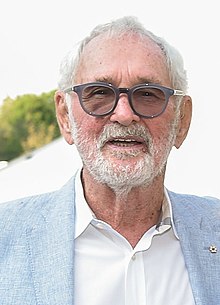Norman Jewison

Norman Frederick Jewison CC OOnt (21 July 1926 – 20 January 2024) was a Canadian film and television director and producer. Jewison addressed social and political issues throughout his filmmaking career, often making controversial or complicated subjects accessible to mainstream audiences. He received the Academy of Motion Pictures Arts and Sciences's Irving G. Thalberg Memorial Award in 1999. He was nominated for 7 Academy Awards, three Golden Globe Awards, and a Primetime Emmy Award.
Jewison directed numerous feature films and was nominated for the Academy Award for Best Director three times in three separate decades for In the Heat of the Night (1967; it won the BAFTA Award for Best Film), Fiddler on the Roof (1971), and Moonstruck (1987).
Quotes
[edit]- I don't make social statements in my pictures [...] though I do feel a film should be about something—that it have a raison d'etre. It should not shy away from social problems.
- "Norman Jewison: ‘I Want “F.I.S.T” To Grip People’", The New York Times (7 May 1978).
- F.I.S.T. was on release. A Labor union film initially set in the 1930s, the acronym stands for Federation of Inter-State Truckers.
- [On why he was not making a theatrical feature film for the studios] They'd say these films were too wordy, too cerebral, too much dialogue [...] They often want films with a minimum of dialogue and lots of action and limited adult themes to sell abroad.
- [On why he was liking directing a television film] They leave you alone; there's no interference, no second guessing.
- So many aspects of our life have disappeared from movie screens [...] And they're now appearing on cable.
- "Little Screen, Big Ambition; Serious Films by Cable Networks Fill a Void Left by Hollywood", The New York Times (3 January 2001).
- Jewison was making Dinner With Friends for HBO which was first screened in August 2001.
- [On John Wayne] The drunker he got the more he wanted to punch me out.
- From an interview, as cited in "'John Wayne didn't like me,' Norman Jewison admits", CTV News (21 April 2009).
- Wayne, who described Jewison as "the Canadian Pinko", had taken a dislike to the film director because of his Cold War satire, The Russians Are Coming, the Russians Are Coming (1966).
- For me, films are about ideas [...] Every director should ask himself, 'Why am I making this picture?' And if you can't answer that, you shouldn't make it.
- From an interview, as cited in "A Director of Ideas With Decades of Them", The New York Times (20 May 2011).
- A retrospective of Jewison's films was being held by the Film Society of Lincoln Center.
- I got involved with the issue of racism when I was a kid in Canada. When I was 17 or 18 we were at war so I joined the Canadian Navy. ... When I got out, I’ll never forget I had a month’s leave which you had to take before they demobilized you. During that time you could do whatever you wanted as long as you reported back. Someone told me that if you go to the States and you’re in uniform they treat you like a king. You can get a ride anywhere for nothing. So I started hitchhiking. I went to Chicago and then I kept going south. I was somewhere just outside Memphis and I wanted to get to the highway. A bus came along and I got on because I didn't have to pay. So I got on and sat in the back because it was a hot day and the windows were down. About five minutes later the bus stopped and the driver – a big beefy guy – looked at me through the mirror and said "you tryin' to be funny sailor?" I said no and he said "well can't you read the sign?" So I look up and there's a hand-painted sign on a piece of tin hanging by a wire in the middle of the bus. It said "colored people to the rear." So I looked around and sure enough there were a few black people sitting around me and the white people were in front. I didn't know what to do. I was so young I didn't realize there was this kind of racial tension in America. So [I] said "I'll get off the bus." He drove off and left me standing on a dusty street by myself.
- "Q&A: Norman Jewison", The Hollywood Reporter (20 October 2011).
- The famous slap, where [Virgil] Tibbs retaliates against a racist landowner, wasn't improvised, though, as has been suggested. I kept telling [Sidney] Poitier that Tibbs was a sophisticated detective, not used to being pushed around. I showed him how to do the slap. "Don't hit him on the ear," I said. "I want you to really give him a crack on the fatty side of his cheek." I told him to practise on me. A black man had never slapped a white man back in an American film. We broke that taboo.
- "How we made In the Heat of the Night", The Guardian (22 November 2016).
About Jewison
[edit]- He gives his actors room and keeps them as calm as he can, because it's easier to speak with them when they're calm. A director has to keep the actors on their toes while the camera's running, but when the scene is done, they should be relaxing, nothing on their minds. There can't be a constant level of seriousness. And with Norman, there's always a lot of laughter.
- Sidney Poitier, as cited in "A Director of Ideas With Decades of Them", The New York Times (20 May 2011).

